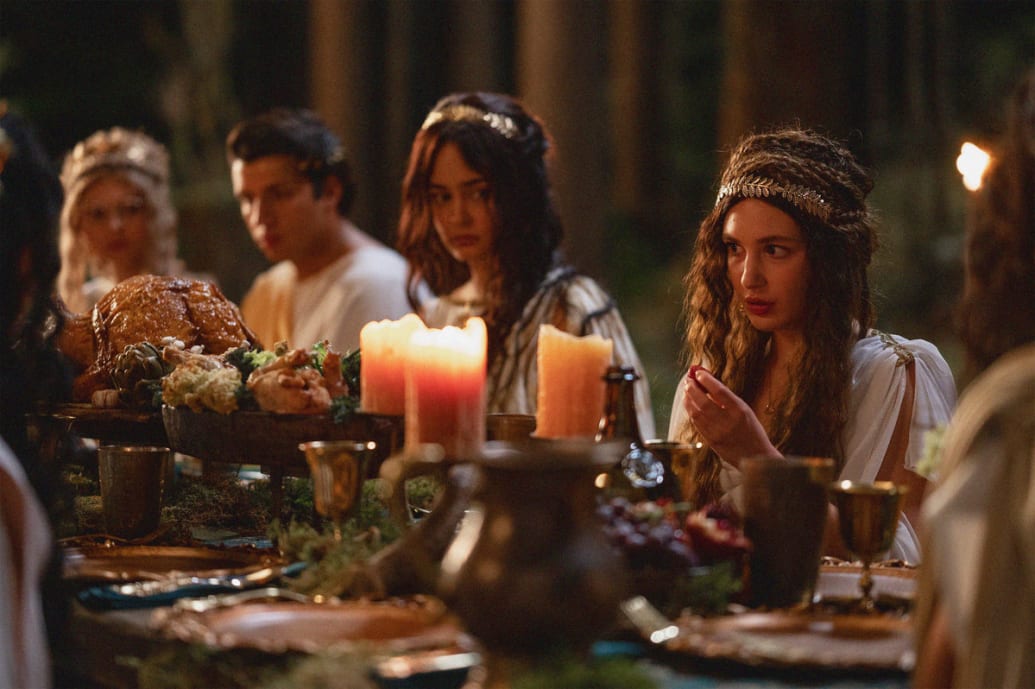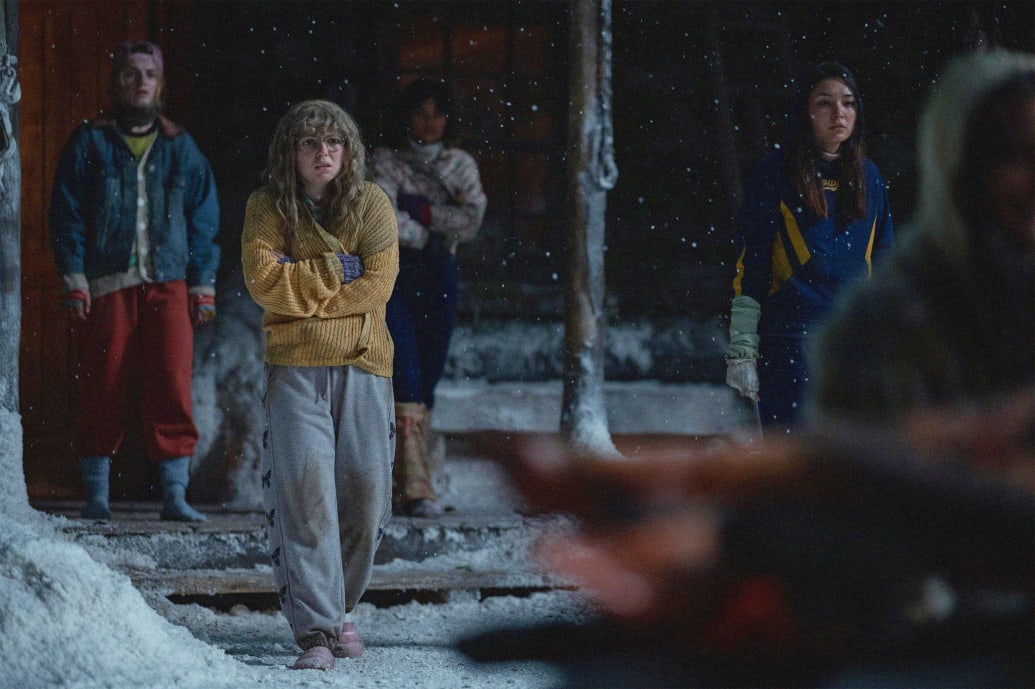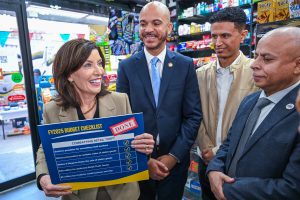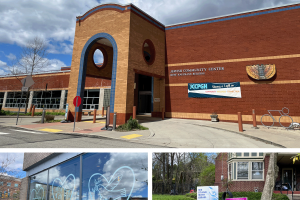Admit it: The spooky breaths, feral cheers, raspy whispers, and garbled yells that comprise the score of Showtime’s smash hit , you both talked about your own sons, who of course act unimpressed by what you do. But now they see the streams of the show’s soundtrack on Spotify and people obsessing over it online. Have your kids finally started thinking you’re cool for working on this show?
Waronker: I mean, there is a billboard on the way to school every day that we have to pass.
Wedren: I actually really trust my son’s ear on things. A lot of times I’m like, “Come listen to this.” He’ll usually give me good feedback when Anna’s not here. I don’t know if any of his friends are Yellowjackets fans.
Waronker: [My son] has friends that are into it. One day he called me from school and he’s like, “When does Yellowjackets come out?” Meanwhile, if I’m like, “Hey, can you listen to something?” He’s like, “Nope. No, I don’t want to see it.” He even had a nightmare [about] the day I asked him to listen to something and he didn’t listen to it.
Wedren: I think [my son] just started watching Yellowjackets. It’s not really his thing. I don’t know that it’s going to be his thing. We’ll see. [The show has] a lot to keep track of.
Waronker: If we didn’t have to watch it, like, 100 times, I would not know half the things that are going on.
Wedren: We’re watching the scenes 50-60 times. We’re working on a cue, and we keep discovering things. This season, interestingly, more than last season, I felt like—I don’t know if this is true or not—the storytelling is so dense. I’m finding, with certain scenes, we’re having to be almost Pointillist about really marking the moments and making sure that the storytelling is clear, because so many layers of things happen so fast. It’s really fun. It’s like another big skill builder.
Waronker: It really is more like a rock opera.
That’s why the theme song has caught on like wildfire. It sums up the show’s ’90s teenage angst perfectly, while still incorporating the supernatural. I think it’s owed to both the use of the Farfisa organ and the haunting vocals. How did you decide what the vocals should be like?
Wedren: It was purely organic, like an instinctual [idea], like so much of the score. It started with [original composter Teddy Shapiro] working with [singer] Caroline Shaw. And then we just kept adding to it, because we’re both singers. … It’s rare to work on something that can support vocals. Because so often the human voice gets in the way of dialogue and you don’t know what to listen to. As people we gravitate toward other human voices. If there are too many, sometimes it doesn’t work. For some reason, in the show, it totally works.
Waronker: I think it was [executive producer and pilot director] Karyn [Kusama], right, who was saying that she wanted the voices to be the voice of the wilderness?
In the new season, a lot [of the new pieces we wrote] are based on themes from the first season, but we completely reimagine them vocally. We even brought Caroline Shaw in for a session.
I would think when you bring her into a session, you would have these big orchestral vocals ready for her to do, and instead it was just her groaning and her phlegm. She had the best time because we’d already kind of done all of these vocal orchestras. So we just had her do just whatever she felt like.

YELLOWJACKETS
Samantha Hanratty as Teen Misty, Kevin Alves as Teen Travis, Courtney Eaton as Teen Lottie and Sophie Nélisse as Teen Shauna in YELLOWJACKETS.
Showtime
Did either of you have anything to do with Florence Welch’s cover of “Just a Girl,” which she teased in a tweet ahead of the season?
Wedren: No! I mean, we do handle her Twitter account. [laughs]
She tweeted a clip of her going through a rack of these beautiful diaphanous gowns. And then she chose a Yellowjackets letterman jacket and put it on.
Wedren: Oh, that’s so rad! That’s awesome!
Waronker: We don’t know a thing about that. But we know things about other things that we can’t say. [laughs]
Wedren: There are other special guest voices this season.
Craig, you said in an interview that composer Nicholas Britell [of Succession] made theme songs hip again. His title credits are another no-skip track for me.
Wedren: Theme songs were my favorite things to do when I first started doing TV, and then they just went awry. I was like, “What about my secret career as a jingle guy?”
Waronker: That’s all I wanted. I still want it.
They’re universal. You could live in any part of the world and still know the words to the themes from Happy Days or Fresh Prince.
Wedren: Totally. There’s something about the brevity of a theme song that’s kind of hardcore punk, where you’re fitting an entire song, with an enormous amount of information and energy, into an extremely short, sharp statement. And I appreciate that.
The music in the show itself can be totally different in tone from the theme song. When Travis and Natalie are trying to have sex, or when Taissa and Shauna are speaking in the diner, the score feels more minimalist, because those are universal human experiences. What was your process for those scenes?
Waronker: I started [composing the score for Natalie and Travis], and then played it for you. But then you loved it, and that meant that it worked.
Wedren: Then I added some guitar, and then we had a teen love theme. It just felt like being a teenager in love with all the melancholy and the falling [in love]. That theme in particular felt like a band we would both have wanted to be in.
Waronker: That’s the thing with this show. There’s an entire world of emotions that are going on at all times. Things like [these quieter scenes] are a nice relief, actually.
Wedren: The really crazy stuff is really fun. It’s just that on a practical level, it’s a giant pain in the ass, because the sessions are so big, and you’re scrolling through, trying to find things. Given our druthers, we’d like to keep it real tight, you know? 10 tracks or less. But I mean, there are literally 100 [tracks for some of them].
I know you’re not allowed to talk about anything. But is there a moment, in the vaguest possible terms, that you can’t wait for people to see?
Wedren: There have been a few cues this season, which are like, “Whoa.” It’s a thing that happens where you’re working on it, and suddenly it comes together, and you’re surprised. You don’t necessarily feel like the authors of it, it just sort of reveals itself to you. And it’s like, “Okay, don’t touch it! Just leave it!”
Then there are also some really, really fun … [pieces] on the simpler side, the less dense side of cues, just like good, almost old fashioned, but weirdo in the Yellowjackets way.
Waronker: [The younger cast is] getting a lot of the crazy, crazy music that we’ve written and then the adults … are getting some really fun [cues].
“Maybe that’s part of the reason why [Yellowjackets is] appealing. It’s identifying the struggle that we’ve all been going through.”
I think it’s impossible to be alive and make art and not be affected by the last few years. Has the pandemic changed your view of what you do or your artistic expression? Has it altered the way you go about your work?
Wedren: I think, energetically, it shows up. But on a conscious level, and in terms of routine, [the pandemic] really didn’t change much. Because our studios are in our backyard, we live in the same neighborhood.
Waronker: That was also nice, because we got to be around each other because we’ve worked through the whole pandemic together. We were in a little bit of a bubble. For me, it kind of opened up, because we didn’t have to go anywhere. I was able to work around the clock. That kind of shifted my energy about how to do this job.
Before, because I’m a mom, I’d have to have more rigid boundaries … I gotta take them to school or whatever. And [the pandemic] really opened that up. I am having a hard time adjusting now that life is getting back to normal.
Wedren: I also think that the pandemic cracked everybody open to allow for something like this show. … The music and the show and the energy of it is so shape-shifting. That feels pretty new. And I think it speaks to sort of where we’ve all recently been.
Waronker: I hadn’t thought about that because they’re trapped, like the entire world was. [We were all] trying to figure out how to survive with, in my opinion, evil forces from above coming down on us, which was our former president. [We saw] that there was an after to the current state. … Maybe that’s part of the reason why [Yellowjackets is] appealing. It’s identifying the struggle that we’ve all been going through, and then the fact that there is going to be life afterward.
I’m not sure how receptive mainstream viewers would have been to something so, by TV standards, experimental, had it not been for COVID.
Wedren: Yeah. It’s something to obsess over, to wonder about, to puzzle over, in that Twin Peaks-y way.
Waronker: Oh, man, is it gonna be fun for you.






